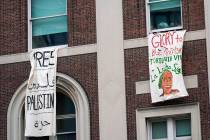Nevada’s false narrative
For decades, the gospel according to the local business community has been that low taxes are the key to growth and diversification. It's simple, the economic development gurus have insisted. Low taxes will lure companies from states with higher taxes.
At long last, after year after frustrating year when nary a notable nongaming company opened its doors in Las Vegas, some smart and brave individuals have stepped forward to trample this tired conventional wisdom.
A group of 40 business and community leaders, meeting under the auspices of UNLV's Lied Institute for Real Estate Studies, has debated the issue and reached consensus on a report titled, "Nevada: 50th in the Nation for Education?"
It's a game-changer -- or at least it should be.
The thrust of the report is that Nevada has focused on low taxes at the expense of education. In the process, it has undermined the true precursor to economic growth -- building a strong educational system that produces a qualified work force.
"If low taxes were the key lure for CEOs and CFOs, a Silicon Valley-style economic cluster would be in Nevada rather than in Northern California or Seattle or Boston or North Carolina's Research Triangle," the report states.
The 17-page report dismisses the long-professed belief that Nevada benefits from promoting itself as a low-tax haven: "The tax issue ranks rather low for executives of companies that are popular targets for corporate recruiters, but the mythology persists that a broader mix of businesses would move here if taxes were lower. That simply is not true, and it's time that Nevada's political, business ... and community leaders drop that narrative."
Instead, "education must become a core value for all Nevadans," according to the report, which calls for "business leaders and our local chambers of commerce" to argue for a "true investment in education" as the path out of this deep recession.
Delving a little deeper into the report, one finds a level of honesty rarely exhibited in a state fueled by positive PR. When the real estate market collapsed and the Great Recession took hold, the high-flying Nevada economy plummeted. "Many of us couldn't make good on ballooning mortgage payments," the report says. "The luxury cars. The boats and vacations. Gone. The home-equity loans were closed. Credit cards were maxed out. And then the jobs themselves disappeared. Tens of thousands of jobs disappeared from the gaming, construction, retail and government sectors."
This is hardly news to the almost 2 million people here, a large percentage of whom are struggling to stay afloat. But it's encouraging to see a group of serious-minded business and community leaders link that crisis directly to the "false narrative" that low taxes will cure all our problems.
Of course, whether their serious-mindedness will catch a wave to Carson City is another question. The Nevada Legislature convenes in February, and education funding will, as always, be a central topic. But will this business group's sensible plea be drowned out by the tea party crowd's overheated rhetoric?
Gov.-elect Brian Sandoval will play a big role in determining how this question gets answered. On the one hand, Sandoval seems to be a smart, pragmatic sort, fully capable of recognizing and embracing the wisdom of the business group's case. On the other hand, Sandoval campaigned on a strict "no new taxes" pledge, foolishly painting himself into a corner.
Will Sandoval follow in the footsteps of the late Gov. Kenny Guinn, a Republican who championed the improvement of public education? Or will he march behind outgoing Gov. Jim Gibbons, who had no vision whatsoever for the state beyond the folly that low taxes will solve everything?
If the Nevada Legislature's mission next year is to cut education budgets, it is dooming the state to years of economic pain. The Cosmopolitan, which opened this week on the Strip, will be the last major resort built in Nevada for a long while. The real estate market won't recover for at least a couple more years, and even when it does come back, it won't be anything like the bubble years of the 1990s and early 2000s. As a result, the construction industry isn't going to be the economic engine of the past few decades.
We can't dwell in nostalgia, hoping for a return to the glory years. We have to look forward, and that means figuring out how to attract new industries to the state -- industries that require a better-educated work force. And there's only one proven way to acquire that kind of work force: nurture it through a quality educational system.
Building such a system will require more funding, not less. As the Lied Institute group's report cleverly notes, Nevada spends $22,000 per year housing a prisoner, while spending just $6,500 per year to educate a Clark County student. Who could possibly settle for that disparity?
Nevada prides itself on its can-do attitude, but it has maintained a can't-do, won't-do stridency when it comes to education. Changing that should be Sandoval and the Legislature's top priority in 2011.
Geoff Schumacher (gschumacher@reviewjournal.com) is the Review-Journal's director of community publications. He has one daughter attending a Nevada university and one attending a Las Vegas high school. His column appears Friday.























